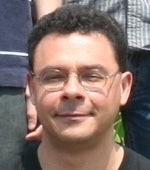
Luis Ibáñez works as Senior Software Engineer at Google Inc in Chicago. Opinions expressed in this site are his own.You can find him in github at: http://www.github.com/luisibanezand in twitter at: http://www.twitter.com/luisibanezHe previously worked as a Technical Leader at Kitware Inc., and Director of Open Source Community Development at the Open Source EHR Agent (OSEHRA). At Kitware he was closely involved in the development of open source software for medical imaging applications, in particular, working with the Insight Toolkit (ITK).Luis is a strong supporter of Open Access, and one of the editors of the Insight Journal, an OA Journal that enforces the verification of reproducibility. In collaboration with other instructors, Luis taught a course on Open Source Software Practices at RPI between 2007 and 2013, and also at the State University of New York at Albany between 2011 and 2014.Luis Ibáñez received a B.S. in Physics from the Universidad Industrial de Santander (Bucaramanga, Colombia) in 1989 and a M.S. in Optics from the same university in 1994. He received a D.E.A and Ph.D. degrees from the Universite de Rennes I (Rennes, France) in 1995 and 2000, respectively. In 1999, Luis Ibáñez joined the Division of Neurosurgery of the University of North Carolina at Chapel Hill and participated as a member of the MIDAG and CADDLab groups. His work at UNC was related to the development of algorithms for 2 and 3D registration applied to image guided surgery. He also participated as developer of the INSIGHT Registration and Segmentation Toolkit sponsored by the National Library of Medicine. Luis Ibáñez joined Kitware, Inc. in February 2002 where he was one of the main developers of the Insight Toolkit (ITK) coordinating its maintenance with other developers and the user community; he is also one of the main developers of the Image Guided Surgery Toolkit (IGSTK) and participated in crafting the operational principles of the Insight Journal. Luis Ibáñez is a strong supporter of Open Access, and the verification of reproducibility in scientific publications and is a regular speaker in ITK training courses, and in events disseminating the principles of Open Source. In August 2014, Luis joined Google Inc as Software Engineer, to work with the corporate engineering team in New York city.

Authored Comments
Hans,
Just as with most open source venues, the audience of opensource.com is open for all to join. One of the goals of hosting the series on Women in Open Source, https://opensource.com/life/14/1/women-open-source-week, is to make clear that as a community we care about the diversity of the participants. It is same reason why we celebrate the participation of newcomers, and why we celebrate the participation of younger people.
Community building is a core value in open source, and it starts with welcoming everyone, and with appreciating their unique skills and motivations.
This forum of opensource.com also happens to live in the Open Internet, so when we write here, we write for everyone. Very purposefully, this is not a site with exclusive membership. Instead it is an open space that welcomes creativity, technical skills, and motivation, among many other displays of community values.
Certainly, one of the core values of open source, is to refuse to accept that things have to continue being in a certain way, just because they have always been so.
Changing the world around us, is what we do; while exclusion and prejudice, is something that we don't do too well.
Mairin,
Thanks for the interesting interview.
I would like to hear more from you an Marie about the specific tools that you are using for creating Badges for Mozilla.
I'm keen of adopting badges in several of the open source communities where I participate, as well as in classes at SUNY Albany and RPI, but have not found ready-to-use tools for creating and distributing the Badges.
I had good luck using badges from inside Moodle last semester, but to use them outside of the academic environment I would need something like a stand alone platform for creating (designing, naming and siging) badges.
I'll appreciate any suggestions,